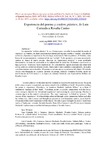Mostrar o rexistro simple do ítem
Experiencia del poema y asidero plástico, de Luis Cernuda a Rosalía Castro
| dc.contributor.author | Caparrós Esperante, Luis | |
| dc.date.accessioned | 2021-07-27T15:03:13Z | |
| dc.date.available | 2021-07-27T15:03:13Z | |
| dc.date.issued | 2021 | |
| dc.identifier.citation | Luis Caparrós Esperante, "Experiencia del poema y asidero plástico, de Luis Cernuda a Rosalía Castro", Bulletin of Spanish Studies, 98:3 (2021), 387-409. | es_ES |
| dc.identifier.issn | 1475-3820 | |
| dc.identifier.uri | http://hdl.handle.net/2183/28234 | |
| dc.description.abstract | [Resumen]: La expresión ‘asidero plástico’ la usa Cernuda para describir la necesidad de anclar el poema en los sentidos, de darle consistencia material para hacerlo creíble o ‘verdad’. Más allá de su lectura, el poema es experiencia. En otro lugar, menciona la ‘falacia patética’, de Ruskin, como forma de enmascaramiento sentimental de esa ‘verdad’. Todo apuntaría así a una enunciación poética en donde el sujeto procura objetivar su ‘experiencia emotiva’ y evita nombrarla directamente. Se trata de construirla en la subjetividad de quien lee. El término experiencia se liga a proceso: ‘el proceso de mi experiencia’. Es conocimiento logrado mediante una inmersión activa, anterior y posterior al texto escrito, donde intervienen sentidos y pensamiento, entidades complementarias, nunca hostiles. El poema es así una nueva experiencia del objeto. El artículo recorre esta búsqueda en la poesía anterior de paisaje, fórmula romántica favorita, desde las insuficiencias de Gil Carrasco a los logros de Antonio Machado con el precedente brillante de Rosalía Castro. | es_ES |
| dc.description.abstract | [Abstract]: ‘Asidero plástico’ is the term used by Cernuda to describe the need for anchor the poem in the senses, to give it a material consistency aimed at its credibility or ‘truth’. Beyond its reading, the poem is experience. Elsewhere, he mentions Ruskin's ‘pathetic fallacy’ as a form of sentimental masking of that ‘truth’. Everything points to a poetic enunciation with the lyrical voice trying to objectify its ‘emotional experience’ and avoiding its direct naming. The key is constructing it in the reader’s subjectivity. The term ‘experience’ is linked to ‘process’: ‘the process of my experience’. It is knowledge achieved through active immersion, before and after the written text, where senses and thought are present as complementary entities, never hostile. The poem is thus a new experience of the object. The article goes through this search in previous poetry of landscape, romantic formula favorite, from Gil y Carrasco’s insufficiencies to Antonio Machado’s achievements and the brilliant precedent of Rosalía Castro. | es_ES |
| dc.language.iso | spa | es_ES |
| dc.relation.uri | https://doi.org/10.1080/14753820.2021.1896860 | es_ES |
| dc.rights | Atribución-NoComercial-SinDerivadas 3.0 España | es_ES |
| dc.rights.uri | http://creativecommons.org/licenses/by-nc-nd/3.0/es/ | * |
| dc.subject | Luis Cernuda | es_ES |
| dc.subject | Gil y Carrasco | es_ES |
| dc.subject | Antonio Machado | es_ES |
| dc.subject | Rosalía Castro | es_ES |
| dc.subject | Poéticas de la Modernidad | es_ES |
| dc.subject | Sensaciones | es_ES |
| dc.subject | Poesía meditativa | es_ES |
| dc.subject | Poesía y verdad | es_ES |
| dc.subject | Poesía y paisaje | es_ES |
| dc.subject | Poesía como proceso de experiencia | es_ES |
| dc.subject | Falacia poética | es_ES |
| dc.subject | Poetics of Modernity. | es_ES |
| dc.subject | Sensations | es_ES |
| dc.subject | Meditative Poetry | es_ES |
| dc.subject | Poetry and Truth | es_ES |
| dc.subject | Poetry and Landscape | es_ES |
| dc.subject | Poetry as a Process of Experience | es_ES |
| dc.subject | Pathetic fallacy | es_ES |
| dc.title | Experiencia del poema y asidero plástico, de Luis Cernuda a Rosalía Castro | es_ES |
| dc.type | info:eu-repo/semantics/article | es_ES |
| dc.rights.access | info:eu-repo/semantics/openAccess | es_ES |
| UDC.journalTitle | Bulletin of Spanish Studies | es_ES |
| UDC.volume | 98 | es_ES |
| UDC.issue | 3 | es_ES |
| UDC.startPage | 387 | es_ES |
| UDC.endPage | 409 | es_ES |
| dc.identifier.doi | https://doi.org/10.1080/14753820.2021.1896860 |
Ficheiros no ítem
Este ítem aparece na(s) seguinte(s) colección(s)
-
GI-HISPANIA - Artigos [145]






